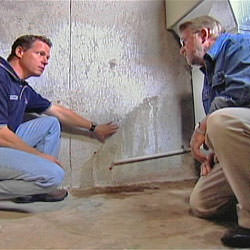Structural engineers are licensed professionals who are trained to analyze the factors that exert force, such as gravity, wind, temperature and pressure, upon a building and to make the call about whether or not the structure can hold up and resist those forces. They have training in areas concerning the structural soundness of buildings. While there may be some overlaps, a structural engineer is not the same as a contractor, inspector or architect.

Contractors and inspectors are skilled at detecting early warning signs that indicate there may be a problem, but engineers can analyze the severity of the problem, what is causing the problem, and what an appropriate solution would be. While architects concentrate on the aesthetics and functionality of a building, the structural engineer makes sure structures support and resist the loads to which a building subjected.
Building additions or altering a house’s layout
An addition could be anything from a room, studio, garage, or in-law suite to something like a glass sunroom or glass enclosed pool. A structural engineer will be able to determine if the planned addition will be able to be built without compromising the original structure’s integrity. He or she can also ensure the addition’s foundation is adequately reinforced. If you’re thinking about altering your house’s layout, keep in mind that removing or altering a load-bearing wall could cause significant structural damage to a home. A structural engineer can accurately determine which walls carry the weight of the home’s structure and how the planned renovations would affect the structural integrity of a home.
Solar panel or wind turbine installation
If, instead of an addition, you’re looking to add sustainable structures to your home or property, such as solar panels or a wind turbine, a structural engineer can perform the appropriate feasibility studies. With solar panels, a structural engineer can verify that your desired panel layout and that the brand/type of panel that you have chosen will work on your roof. Roof systems are not usually designed for the weight of solar systems or for the foot traffic that installation and maintenance brings. The structural engineer will make sure that your roof can handle the load and lift of the panels and will recommend reinforcements, if necessary. With wind turbines, a structural engineer can perform a wind feasibility study and provide you with a probable cost for the installation of the correct equipment for the site. He or she can also identify the zoning restrictions relative to the installation.
Purchasing or selling home
Whether you are purchasing or selling your home, if an inspector says that a house has a structural problem that requires extensive repair, hire an engineer to review the situation. In some cases, an engineer can save homeowners large amounts of money in situations that aren’t nearly as bad as they are initially made out to be.
Building a new home
If you’re building a custom home, you’ll want to hire a structural engineer to make sure the plans for the house are sound. An engineer will also consider the building site for suitability for the intended use, integration with existing site features and impact on the environment.
Structural damage
Whether you have noticed structural damage, or a contractor or inspector has pointed it out to you, it is best to contact a structural engineer in order to determine the seriousness and cause of the issue, as well as recommend solutions. Signs of structural damage might include cracks in foundation walls, bowing walls, uneven floors, cracks around windows, doors that stick or standing water in your basement after a hard rain.
Water, fire, wind or termite damage
Wind, fire, termite, water or flood damage can threaten the integrity of a home or other structure. As with other forms of structural damage, a structural engineer can evaluate the degree of the problem and recommend an appropriate solution. Through forensic investigation, an engineer will also be able to determine whether or not an issue existed prior to an event for a claims adjuster.
If any of the above situations apply to you, seek out a structural engineer with the appropriate state licenses and certifications, as well as insurance. He or she will be able to ensure that your structure is strong, stable and able to stand for many years to come.
Article Credit: BeStructural and Wikipedia